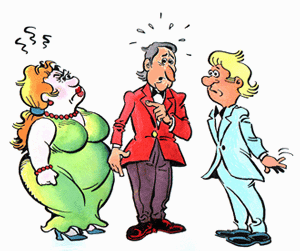linguo-, lingu-, lingua-, -linguist, -linguistic, -linguistical, -linguistically +
(Latin: literally tongue; and by extension, speech, language)
From Old Latin dingua which is a cognate (kindred) with Old English tunge, The change of d (in Old Latin dingua) to l (in Latin lingua) was probably due to dialectal influence (the so-called "Sabine l"). It was facilitated by a folk-etymological association with lingere, "to lick", the tongue having been conceived as "the licking organ".
2. The human use of spoken or written words as a communication system.
3. A system of communication with its own set of conventions or special words.
4. A nonverbal form of communication used by birds and animals.
5. The use of signs, gestures, or inarticulate sounds to communicate something.
6. The verbal style by which people express themselves; such as, the language of diplomacy.
7. Like English tongue, Latin lingua "tongue" was used figuratively for "language"; from it English gets linguist and linguistic.
In the Vulgar Latin spoken by the inhabitants of Gaul, the derivative linguaticum emerged, and this became in due course Old French langage, source of the current English language.

A click on the image will take you to the series of illustrated quizzes which will appear in random order or you may click on this image quiz link.
An embarrassing example of lapsus linguae.

This shows that a lapsus linguae can be embarrassing, to say the least. The situation could also be considered a lapsus memoriae or a "lapse of memory".
There is one more mental lapse, one that involves carelessness in writing: lapsus calami or a slip of the pen. The word calamus was a reed formerly used as a pen.
A lapsus linguae can result from laliophobia or lalophobia
In the world of human relations, a person can suffer from laliophobia (lalophobia); that is, a terror of talking or of stuttering when trying to talk.
An individual's speech difficulty may be aggravated by situations that arise from anxieties or fears of self-consciousness.
Of course, there is also the other condition called, lalomania, a compulsion or abnormal desire to talk excessively. Neither situation is considered desirable in human relations.
See this special presentation about public personalities who have committed various forms of lapsus linguae.
2. A common language consisting of Italian mixed with French, Spanish, Greek, Arabic, and Turkish; the mixed language used chiefly by merchants throughout the Mediterranean ports until the 18th century.
3. Any hybrid or other language used over a wide area as a common mode of discourse between groups or peoples speaking different languages; especially as a commercial or trade jargon.
4. A useful makeshift lingo or commercial tongue among peoples of different speech; such as, English and a local language in various countries.
A jargon used for elementary communication by medieval traders and sailors in the Mediterranean, derived for the most part from the Romance languages [Italian mixed with French, Greek, Arabic, etc.]. Generally, it describes a mixture of languages used as a means of communication in business.


